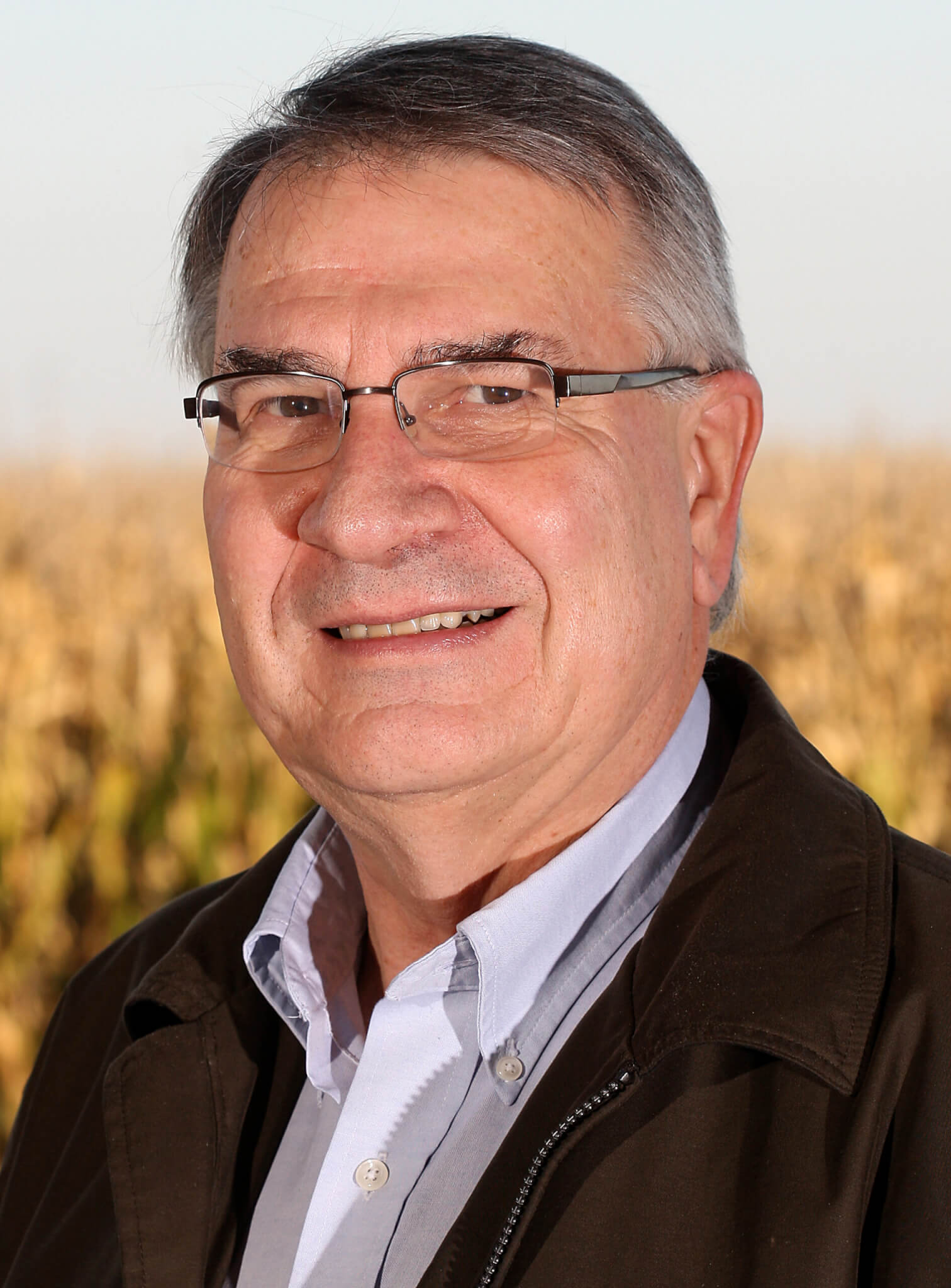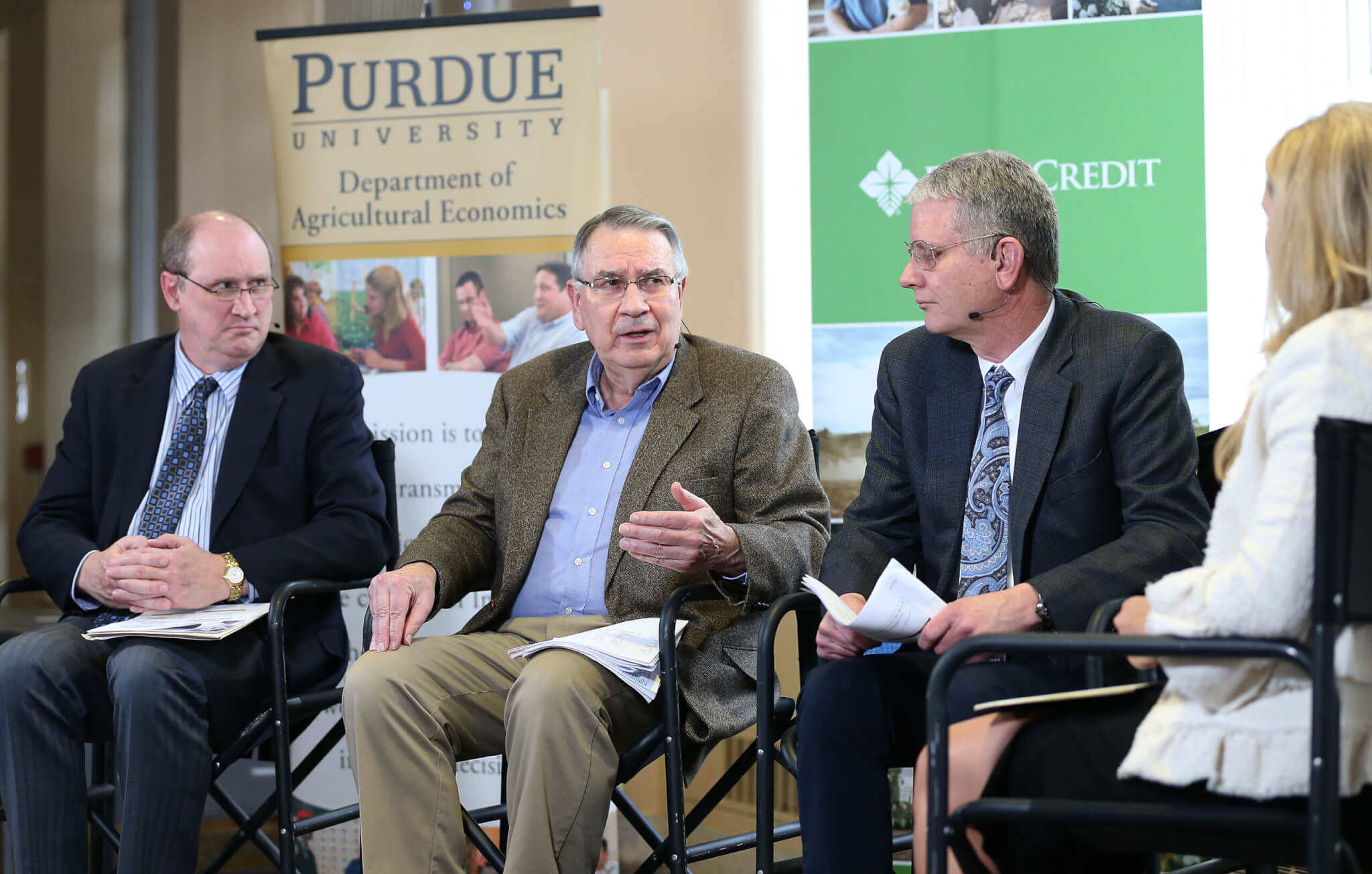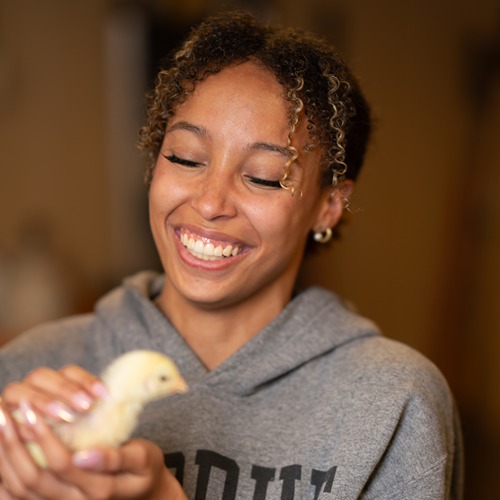Retiring professor reflects on decades of opportunities, changes and constants
As retiring professor of agricultural economics Chris Hurt reflects on his 40-year career at Purdue, he talked about the people for whom he has worked through Extension and as a professor.
“Growing up on the farm, my neighbors and our community, they were wonderful people. I think of the people I have worked for in my job to be just like those neighbors—strong family people, hardworking and appreciative people. To think that I could bring the information to them to make better decisions, that’s been my contribution to society.”
Being a “tireless public servant” is how Jayson Lusk, agricultural economics’ department head, described this commitment. “Chris spent thousands of afternoons, nights and weekends sharing his insights about agricultural markets. He helped generations of Indiana farmers make better planting and crop marketing decisions. Chris was the main attraction at gatherings all around the state; if you wanted the audience to stay till the end, you put Chris last on the program.”

Hurt arrived in Purdue’s agricultural economics department in 1981. From the time he was a boy running a small egg business, Hurt was attracted to the entrepreneurial spirit of agriculture, something he said was common among farming families.
“Parents encouraged children to be entrepreneurial so that they would develop that internal motivation and drive. They were right because you take a lot more interest in things that are yours and that you have a connection to--you do it for the family, but you also do it for yourself. The life lessons you learn are the foundation for your future. A job isn’t done until it’s done.”
He explains that his parents, who were meticulous business people who benefited from the Extension information available to them, definitely influenced his interest. “They kept track of every expenditure, down to the bag of washers they bought for a nickel.”
Hurt arrived at University of Illinois planning to major in animal science. “I didn’t realize until college that the business side of the enterprise resided in agricultural economics. The light bulb went on at that moment. I liked animals, but what I really enjoyed was business.” He went from being a B to an A student and was soon offered an opportunity to pursue his master’s degree at Cornell University.
Cargill, a major international agriculture and food corporation, recruited him from Cornell to work in Minnesota and Georgia. He says that from day one the company was training him for a higher management position. What he realized over the next few years, however, was that he wanted to start his own business. When his parents discussed selling their farm, Hurt saw this as his opportunity and he and his wife Becky returned to Illinois to start a hog business there.
Hurt doesn’t have any regrets about that decision. Although they ultimately closed the hog business, the Hurts eventually purchased all the Hurt farmland to keep the farm in the family.
During the time he and his wife ran their business full time, they were also completing advanced degrees at University of Illinois, 64 miles from their barn in Casey.
Becky Hurt remembered: “We kept that road hot as Chris worked on his Ph.D. and I did a master’s. There was a week when Chris's dad (on his way with Chris’s mom to see their son in Urbana), Chris, and I all got speeding tickets in the same small town that had become a speed trap.”

Hurt also taught agricultural economics at Lakeland Community College while working on his Ph.D. After earning his doctorate, he accepted a position at Purdue, where he felt he would have the opportunity to have a bigger impact.
During the next four decades, as he and his wife raised their four sons and welcomed grandchildren, Hurt had that impact as he actively analyzed massive changes in the agricultural economy that he shared with farmers in small and large gatherings throughout the country including testifying at congressional hearings in the United States Capitol. He also studied massive changes in the pork industry in the United States and was invited to China, Japan, South Korea and Malaysia to address the implications for the global industry.
“Agricultural history is rich. Cycles have always been important in agriculture. The nature of farm income has always been short periods of booming farm income and escalations of land values followed by periods of decline where there are long periods at lower but much more stable income.”
Hurt describes how globalization became a primary trend in post-WWII agriculture as Russia, Japan and China entered agriculture markets. More recently, of course, there has been a turn away from globalization to being more nationalistic. Hurt observes, “We didn’t question globalization for 60 years. Now we need to see what happens.”
Throughout his career Hurt published numerous articles including a highly successful one with his longtime colleagues Phil Abbott and the late Wally Tyner of which he is particularly proud. Titled “What’s driving food prices,” the study focused on understanding the economic drivers of the global food crisis at that time.
Hurt also served on the editorial board and as editor of the Purdue Ag Economics Report (PAER) for many years. His faculty colleague and former department head Ken Foster described Hurt first reaching out to encourage him to write for PAER when Foster was a new assistant professor. “Chris threw me a life preserver, and, like any lost and drowning soul, I clutched to it for all it was worth.”
“Chris has a keen understanding about the importance of audience. It’s a combination of ‘you can’t teach effectively if you don’t know who you are teaching’ and ‘the best people to teach are the ones who are open to being taught at the time,’ “explained Foster.
Hurt is widely known because of his extensive and diverse outreach through the Extension network. As he explains it, “The most important part of Extension is the unbiased scientific information that we provide to people. We don’t have anything to sell.” He praises the collaboration among Purdue departments, colleagues and the USDA. “I’d say that’s a big Wow, what a remarkable effort.”
Hurt thanks his wife Becky for always supporting his work, with all its evenings and weekends away. After all those years of working with what he describes as “the wonderful people in agriculture,” he is now looking forward to spending more time with her and his children and grandchildren.
He also credits the agriculture deans and department leaders with whom he has worked. “Purdue Agriculture has always been a leader in advancing the land-grant mission. These leaders have supported that mission, never losing focus on the people we serve and always serving their needs. They have not only supported the mission, but they also encouraged the faculty to do what they do really well.”
The Glenn W. Sample Dean of Agriculture Karen Plaut returns the praise for Hurt’s commitment. “Chris represents everything that is best about the land-grant mission, dedicating himself to provide economic guidance based on sound research. Throughout our state and the country, Chris Hurt is a trusted voice for agriculture.”
Although best known around the state and country for his research and outreach, Hurt has also welcomed generations of students to his classroom. One thing remains constant, he explains, whether with youth, students, farmers or business people, even with all the change in technology and the world: “The economic principles we teach remain the same. That’s why they need to be taught.”






